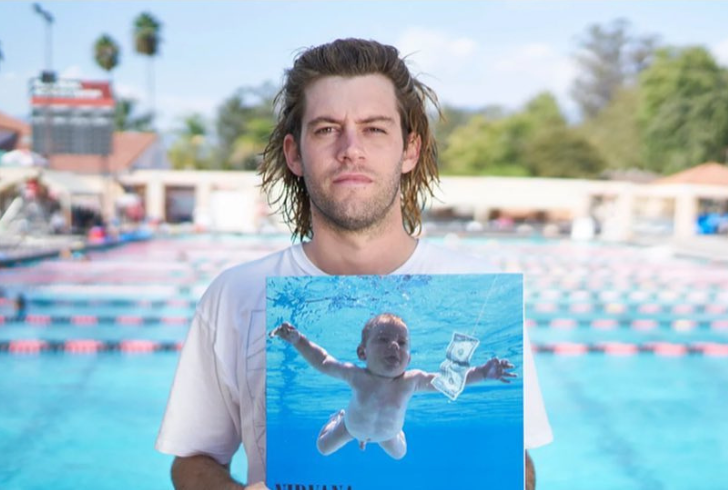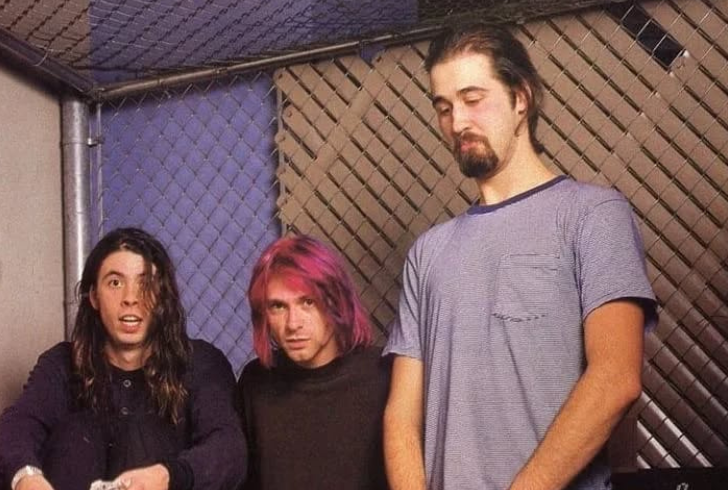The long-standing legal dispute surrounding Nirvana’s groundbreaking 1991 album “Nevermind” has officially reached its end. A federal judge has once again dismissed the lawsuit filed by Spencer Elden, who appeared as a baby on the album’s cover, claiming that the image amounted to child pornography.
The Case and Its Background
The lawsuit centered around the famous underwater photograph of Elden as a naked infant swimming toward a dollar bill on a fishhook. The image, shot by photographer Kirk Weddle at the Pasadena Aquatic Center in California, became one of the most recognizable covers in music history. Despite its cultural significance, Elden, now 34, alleged that the photo was sexually exploitative and had caused him ongoing personal harm.

Instagram | jopiazzaauthor | The legal case centered on the famous photo of Elden, a naked infant, swimming toward a dollar on a fishhook.
He first filed a lawsuit in 2021 against Nirvana and Universal Music Group (UMG). The defendants included surviving band members Dave Grohl and Krist Novoselic, Courtney Love, the widow of the late Kurt Cobain, and photographer Weddle.
The Court’s Decision
U.S. District Judge Fernando Olguin dismissed the lawsuit for the second time. He ruled that “no reasonable jury would consider the picture pornographic.” The judge explained that, aside from the plaintiff’s nudity, “nothing about the image comes close to bringing it within the scope of the child pornography statute.” Olguin compared the photograph to “a family photo of a nude child bathing,” highlighting the importance of artistic context.
The case has a long procedural history. In 2022, Judge Olguin first dismissed it, saying Elden’s claims were filed too late. The 9th Circuit Court of Appeals revived the lawsuit in 2023 and sent it back for review. After reconsideration, Olguin again found no legal basis for Elden’s claims.
Reactions from Both Sides

Instagram | off1cial_nirvana | The final court ruling closed the "Nevermind" lawsuit chapter, affirming the album cover's artistic expression.
Attorneys representing Nirvana welcomed the court’s decision. The band’s lawyer, Bert Deixler, said they were “delighted that the court has ended this meritless case and freed our creative clients of the stigma of false allegations.”
Elden’s legal team did not respond immediately to requests for comment.
The defendants have consistently argued that the photo is a form of artistic expression. Moreover, they pointed out that Elden once embraced his role in the image. He even recreated the photo as an adult during the album’s anniversary celebrations.
The End of a Legal Chapter
After years of legal disputes, the court’s decision closes this chapter for Nirvana and everyone connected to the album. The lawsuit was dismissed twice, leaving no basis for further action. The ruling confirms that the "Nevermind" cover represents artistic expression, not exploitation.
Judge Olguin compared the image to an innocent family snapshot, highlighting the importance of context in interpreting art. For Nirvana’s legacy, this decision reinforces the band’s creative integrity and ends a case that had lasted far too long.
The "Nevermind" cover remains a powerful symbol of Nirvana’s influence. It shows how art can continue to spark discussion even decades later. Now that the legal issues are resolved, the album’s legacy can focus on its music, its message, and the cultural changes it inspired.




